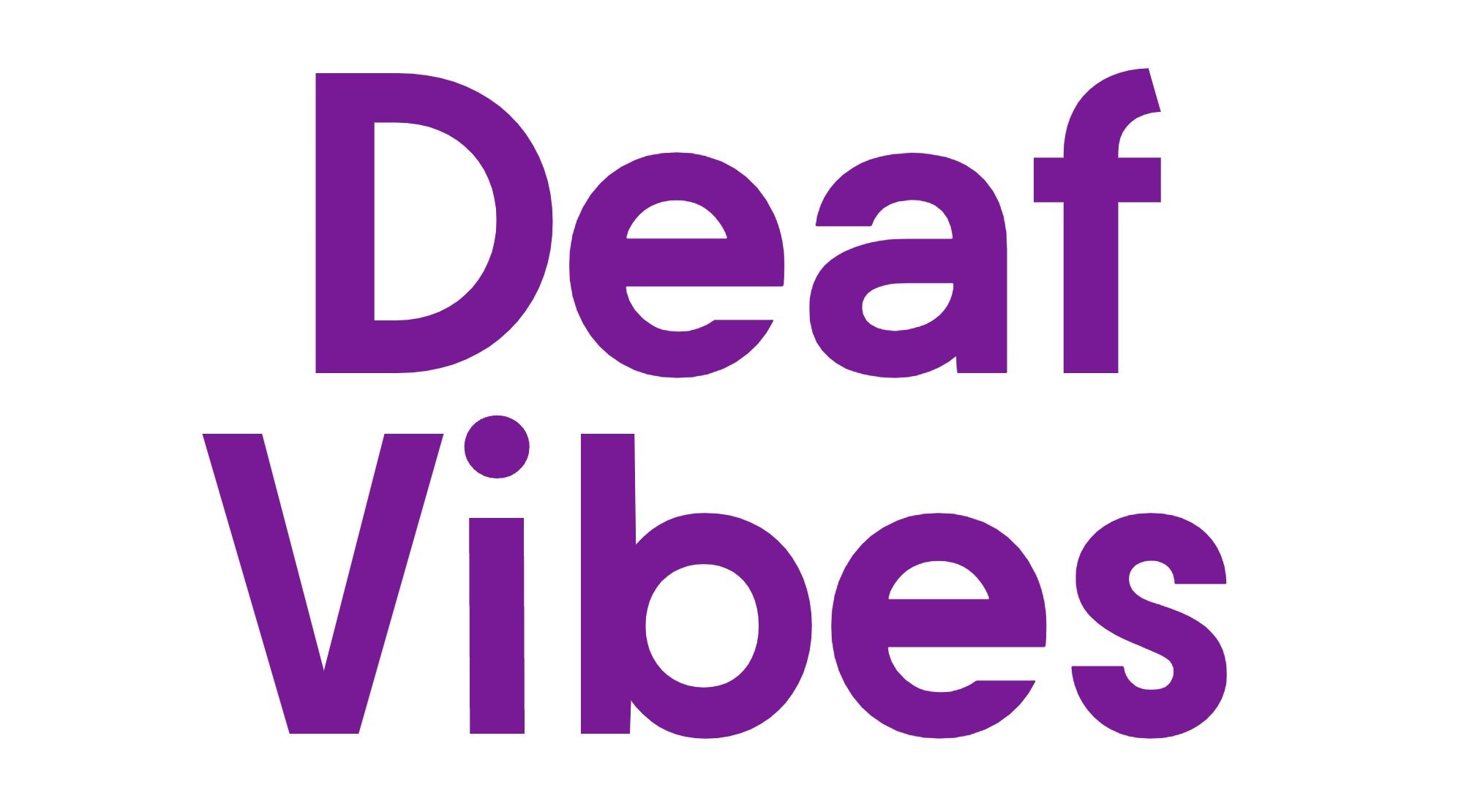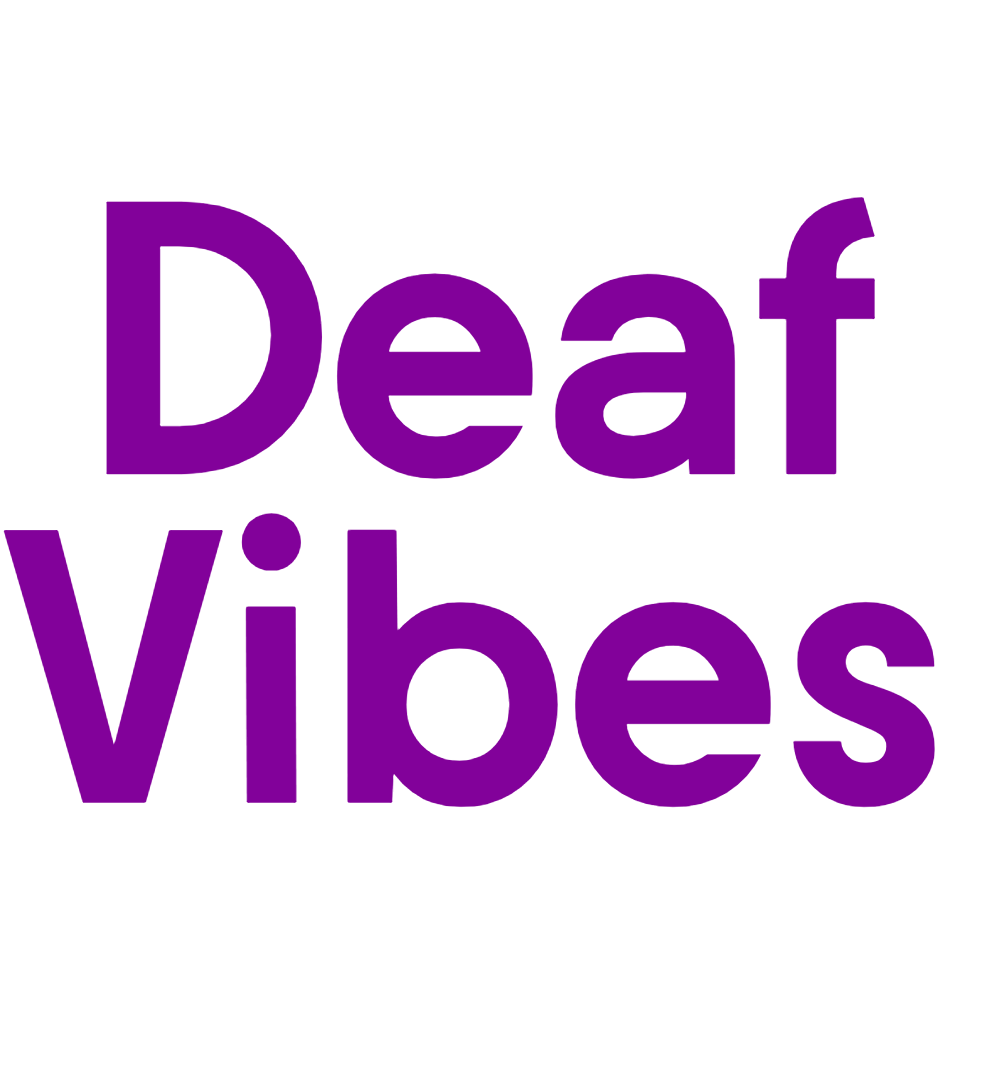Therapies and Interventions
Speech Therapy for Adults Near Me: A Comprehensive Guide
Journey into the world of speech therapy for adults near you, discover the transformative power it holds for enhancing communication skills and quality of life.
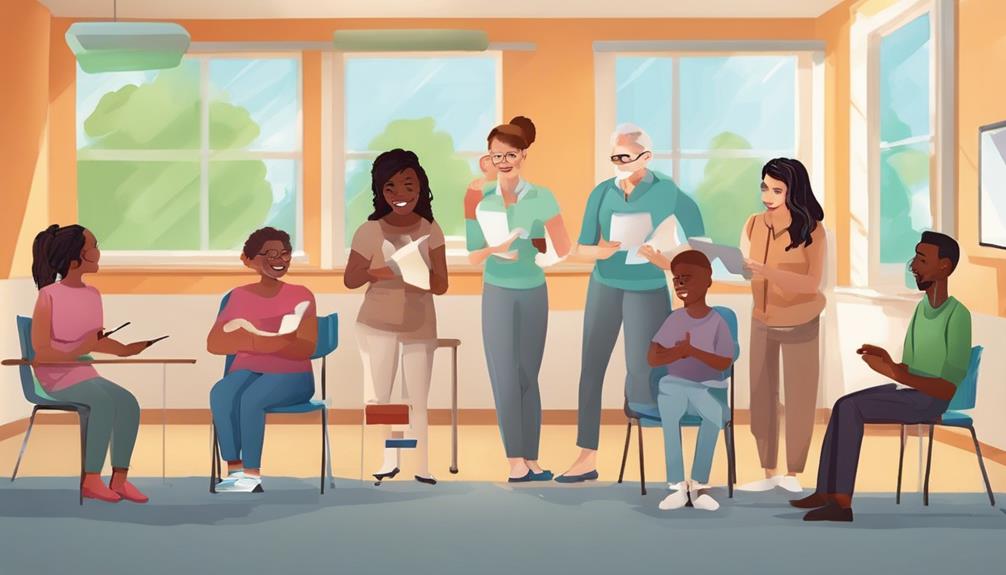
Embarking on the quest to comprehend speech therapy for adults in our vicinity, we discover an abundance of resources and support ripe for exploration.
The landscape of speech therapy has evolved significantly, offering tailored solutions for a myriad of speech-related challenges faced by adults.
But what exactly does this comprehensive guide unveil about the transformative potential of speech therapy for adults in our communities?
Let's dive into the intricacies of this vital tool that could potentially reshape not just our communication skills, but also our overall quality of life.
Key Takeaways
- Enhances communication skills and quality of life for adults.
- Addresses various speech disorders like aphasia and dysarthria.
- Tailored treatment options available for specific speech issues.
- Utilizes specialized therapies and techniques for effective treatment.
Benefits of Speech Therapy for Adults
When adults engage in speech therapy, they gain valuable tools to enhance their communication skills and overall quality of life. Speech therapy offers a range of benefits for adults, particularly in improving their communication skills. Whether it's addressing speech and language difficulties, learning compensatory strategies for better articulation, or working on cognitive-communication skills after a brain injury, speech therapy plays a crucial role in helping adults overcome these challenges.
Types of Speech Disorders in Adults
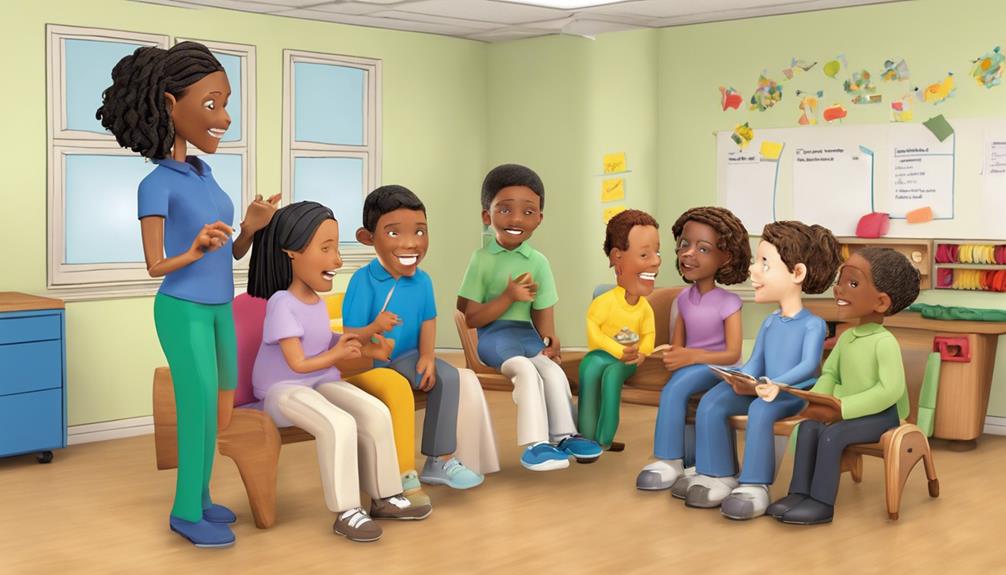
As we explore the types of speech disorders in adults, it's crucial to understand the common challenges individuals face. These include aphasia, apraxia, dysarthria, and dysphagia.
These disorders can stem from various causes such as stroke, brain injury, or neurological conditions, impacting speech and communication abilities differently.
Fortunately, adults with speech disorders have access to a range of treatment options tailored to address their specific needs and improve overall communication skills.
Common Adult Speech Disorders
Common adult speech disorders encompass a range of conditions, including aphasia, apraxia, dysarthria, and stuttering, each presenting unique challenges to communication and speech production.
Aphasia affects language processing, often occurring after a stroke, impacting communication ability.
Apraxia, a motor speech disorder, disrupts the coordination of speech movements, affecting articulation.
Dysarthria leads to speech articulation difficulties due to muscle weakness or paralysis, impacting speech clarity.
Stuttering, a fluency disorder, causes interruptions in speech flow, affecting the rhythm of communication.
Evaluation and treatment by speech-language pathologists can help individuals with these disorders improve their language skills and regain confidence in expressing themselves effectively. If you or a loved one is experiencing speech difficulties, seeking professional help is a significant step towards better communication.
Causes of Speech Issues
Neurological conditions such as stroke, traumatic brain injury, and Parkinson's disease are among the factors that can cause speech issues in adults. These conditions can significantly impact an individual's ability to communicate effectively.
Here are some common causes of speech disorders in adults:
- Aging: As we age, changes in vocal quality, articulation, and fluency can contribute to speech difficulties.
- Environmental Factors: Smoking, excessive alcohol consumption, and vocal strain can affect speech production in adults.
- Genetic Predisposition: Some individuals may have a genetic predisposition to certain speech disorders.
- Medication side effects: Certain medications can have side effects that impact speech abilities.
- Neurological Diseases: Conditions like multiple sclerosis or ALS can also lead to speech challenges.
Understanding these underlying causes is crucial in tailoring effective speech therapy interventions to improve communication and overall quality of life.
Treatment Options Available
When exploring treatment options for speech disorders in adults, it becomes essential to consider the diverse types of challenges individuals may face in their communication abilities.
Common types of speech disorders in adults include stuttering, spasmodic dysphonia, slurred speech, aphasia, and apraxia. Evaluation is crucial to determine the specific speech disorder a patient is experiencing for targeted treatment.
Specialized therapies and interventions are tailored to address the unique needs of adults with various speech disorders. These treatments aim to improve communication outcomes for individuals struggling with sound production issues in speech, singing, or learning.
Research in adult speech therapy focuses on areas like stuttering, brain imaging, and the neurobiology of music. Through clinical evaluations and personalized therapy plans, individuals can work towards enhancing their communication skills and overall quality of life.
Finding a Qualified Speech Therapist
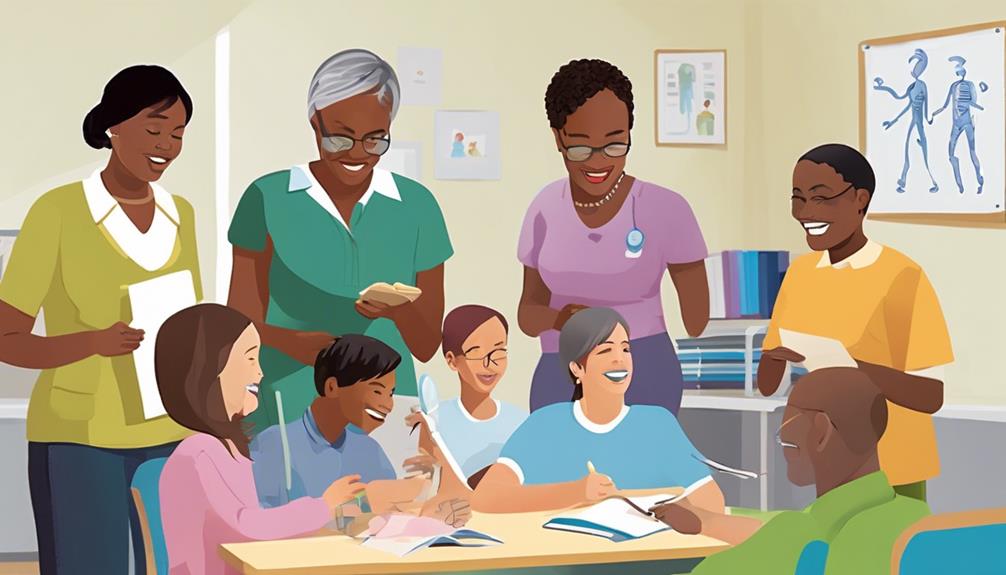
As we aim to find a qualified speech therapist, it's crucial to pay attention to specific credentials they hold, such as specialized training in adult speech disorders.
Experience plays a vital role, so seeking therapists with a proven track record in treating adult communication challenges is essential.
Additionally, exploring therapists who offer specialized treatment options tailored to individual adult needs can greatly enhance the effectiveness of speech therapy sessions.
Credentials to Look For
To find a qualified speech therapist for adults, seek individuals with a Master's degree in Speech-Language Pathology or Communication Sciences and Disorders, state licensure, and a Certificate of Clinical Competence from ASHA. When looking for the right therapist, consider the following:
- Master's degree in Speech-Language Pathology or Communication Sciences and Disorders
- State licensure in speech-language pathology
- Certificate of Clinical Competence in Speech-Language Pathology from ASHA
- Specialized training or experience in treating adult speech and language disorders
- Experience working with adults facing various speech and language challenges
These credentials ensure that the therapist has the necessary qualifications to provide effective speech therapy tailored to the unique needs of adult clients.
Experience Matters Most
Experience significantly influences the quality of care provided by a speech therapist for adults, guiding the personalized treatment tailored to individual needs and goals. When seeking a qualified speech therapist, look for extensive experience in treating adults, especially with common speech disorders like aphasia, apraxia, and dysarthria. Prioritize therapists with a successful track record of outcomes and patient satisfaction. A therapist who offers personalized treatment plans can make a significant difference in your progress. Ensuring that the therapist has the necessary qualifications and certifications is crucial for effective therapy. Here is a helpful table to consider when evaluating a speech therapist:
| Experience | Common Disorders Treated | Successful Outcomes |
|---|---|---|
| Extensive | Aphasia, Apraxia, Dysarthria | High Patient Satisfaction |
| Specialized | Stuttering, Voice Disorders | Positive Therapy Results |
| Varied | Accent Modification, Swallowing Issues | Improved Communication Skills |
Specialized Treatment Options
In seeking specialized treatment options for speech therapy, it's essential to prioritize finding a qualified speech therapist who can cater to individual needs and conditions effectively. When looking for a speech therapist, consider the following:
- Personalized Care: Qualified therapists offer tailored treatment for disorders like aphasia and dysphagia.
- Team Collaboration: Treatment plans are developed by a team of specialists to ensure the best outcomes.
- Advanced Techniques: Therapists use innovative tools like Melodic Intonation Therapy and Visi-Pitch.
- Specialized Treatments: Therapists address Orofacial Myofunctional Disorders and swallowing difficulties.
- Targeted Programs: Specialized treatments like Lee Silverman Voice Treatment for Parkinson's patients are available.
Finding the right speech therapist can make a significant difference in your journey towards improved communication and overall well-being.
Initial Consultation and Assessment

When scheduling an initial consultation for speech therapy, what comprehensive assessments are typically conducted to evaluate speech and language abilities?
During the initial consultation, a thorough assessment of speech production, language comprehension, cognitive skills, and communication challenges is conducted. Specialized tests and tools are utilized to identify areas of strength and areas needing improvement in speech and language. The results of these assessments play a crucial role in creating a personalized treatment plan tailored to the individual's specific communication needs.
Customized Treatment Plans for Adults

How can tailored treatment plans in speech therapy empower adults to achieve their communication goals effectively and efficiently? Customized treatment plans for adults are crafted with individual needs and goals in mind, ensuring the best outcomes. Here are some key points to consider:
- Personalized Approach: Treatment plans are tailored to address specific speech disorders like aphasia, apraxia, dysarthria, and dysphagia.
- Team Collaboration: A team of doctors and specialists work together to develop comprehensive plans for each individual.
- Exploring Alternatives: Alternative communication methods and devices are recommended to meet unique needs effectively.
- Client Involvement: Collaborative efforts with clients are emphasized to enhance communication skills and encourage independence.
- Holistic Care: The focus is on providing holistic care to adults, similar to recommending the perfect dish at a restaurant – personalized service to cater to individual preferences.
Techniques and Approaches in Speech Therapy
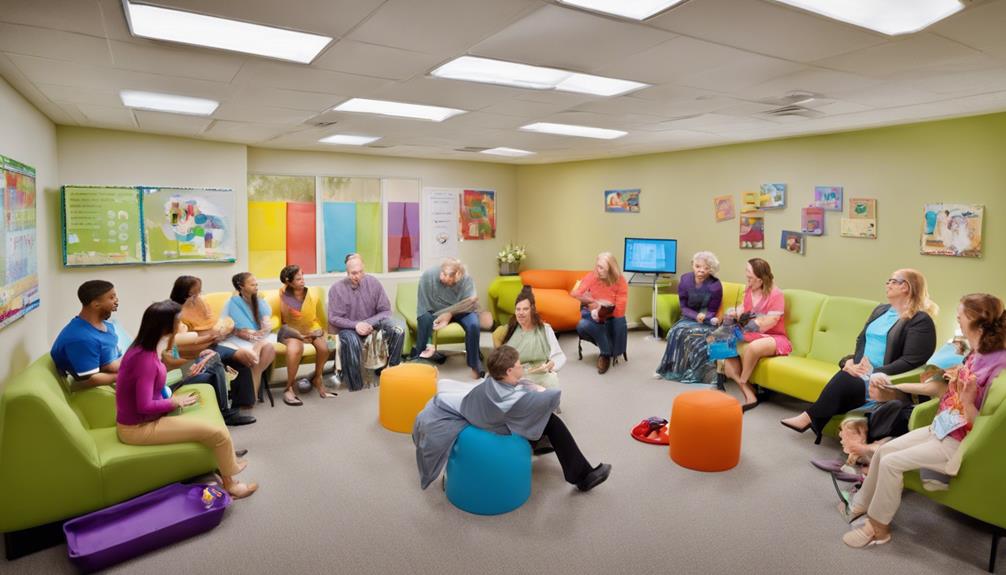
Crafting tailored treatment plans in speech therapy involves employing specialized techniques and approaches to enhance adults' communication skills effectively and efficiently. Techniques such as melodic intonation therapy, which uses intoned speech and musical elements to aid in language production, have shown promising results.
Additionally, therapists explore alternative communication methods, such as sign language or communication boards, to cater to individual needs and preferences. Vital Stim Therapy, a specialized treatment that focuses on swallowing difficulties, may include compensatory strategies during meals and guidance from a speech pathologist to improve swallowing function.
For conditions like aphasia, apraxia, dysarthria, and dysphagia, specialized treatments are available to target specific speech and language challenges. Collaborative approaches with clients often involve the use of electronic devices and video swallow studies for accurate diagnosis and treatment.
Progress Tracking and Adjustments

Tracking progress and making necessary adjustments are essential components of effective speech therapy for adults, ensuring tailored treatment plans lead to improved communication skills. Evaluations play a crucial role in measuring advancements in speech and language abilities. Adjustments to the therapy plan are necessary to optimize outcomes based on progress, goals, and feedback.
Monitoring data points like speech intelligibility, fluency, and communication effectiveness helps gauge the therapy's effectiveness. Collaborating with clients to set realistic goals and tailor treatment plans to address specific communication challenges is vital. Ongoing communication and feedback between the therapist and the client facilitate timely adjustments to the therapy approach for better results.
- Regular evaluations to measure improvements
- Adjustments based on progress, goals, and feedback
- Monitoring speech intelligibility, fluency, and communication effectiveness
- Collaborating with clients to set realistic goals
- Ongoing communication for timely adjustments
Integrating Technology in Speech Therapy

Have you ever wondered how technology is revolutionizing speech therapy for adults? Integrating technology in speech therapy has transformed the way assessments are conducted and treatments are delivered. Electronic devices and computer programs play a crucial role in enhancing the quality and effectiveness of therapy sessions. Specialized software programs like Visi-Pitch and Bungalow are commonly used to target specific speech goals. Video swallow technology, such as videofluoroscopy, enables speech therapists to accurately diagnose and treat swallowing difficulties. Additionally, electronic devices like those used in Vital Stim Therapy provide valuable support during swallowing therapy sessions, offering guidance from a speech pathologist.
| Technology Integration | Examples |
|---|---|
| Electronic Devices | Vital Stim Therapy |
| Computer Programs | Visi-Pitch, Bungalow |
| Video Swallow Technology | Videofluoroscopy |
Support Systems for Adult Speech Therapy
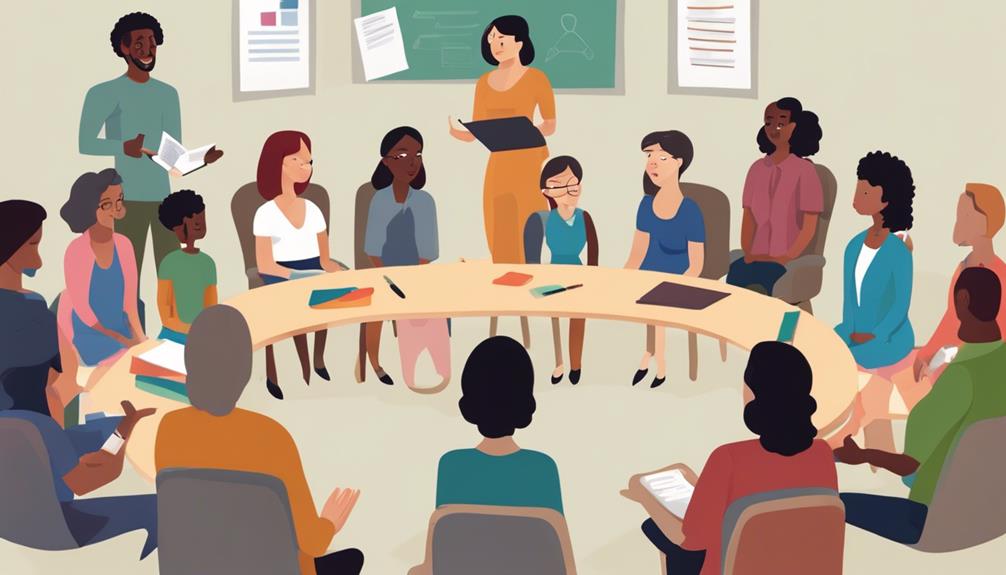
Exploring the diverse range of support systems available for adult speech therapy unveils a myriad of tailored programs addressing various communication needs and challenges. When seeking assistance, consider the following options:
- Aural Rehabilitation Services: These services offer training in informational counseling and speech reading for adults with listening challenges using amplification.
- Adult Language and Cognition Programs: Providing individualized treatment for adults with neurological conditions to address communication needs at work, home, and in social settings.
- Post-Stroke Communication Support: Weekly communication groups for adults with aphasia, available in-person or via telepractice.
- Accent Training Program: Small group discussions on communication and public speaking, focusing on enhancing pronunciation of General American English.
- Adult Literacy and Book Club (Page Turners): Sessions via telepractice using Zoom for Healthcare to help adults develop literacy skills through book club sessions.
These support systems cater to various needs and offer diverse delivery methods, ensuring individuals can access the help they require.
Continuing Care and Maintenance
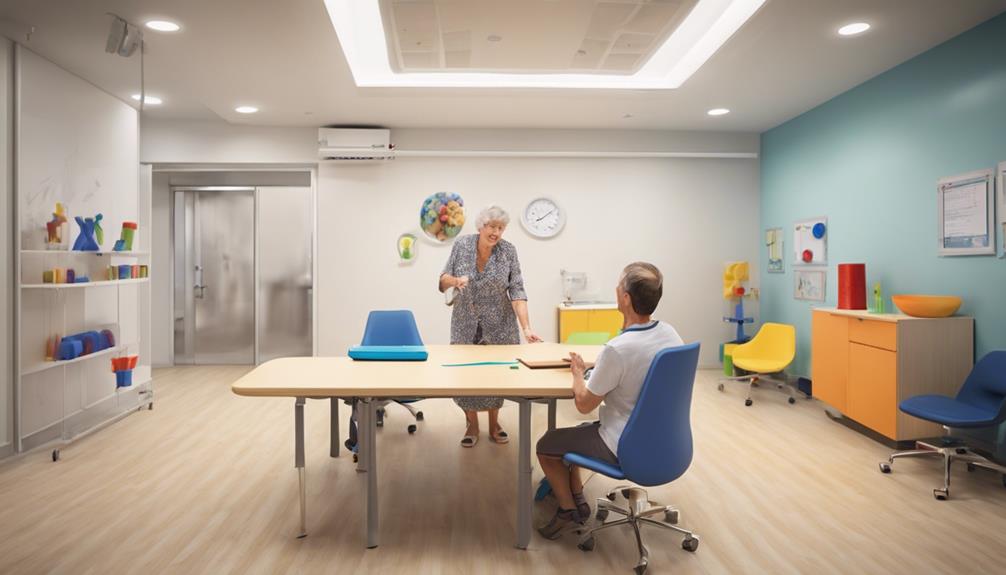
Continuing to prioritize regular follow-up sessions is essential in maintaining and enhancing the progress achieved through adult speech therapy. These sessions play a crucial role in reinforcing learned skills, adjusting treatment plans as necessary, and providing ongoing support for continued success. By participating in these regular follow-up sessions, individuals can ensure that they're staying on track with their communication goals and addressing any new challenges that may arise.
The frequency of these follow-up sessions may vary depending on each person's specific needs and the progress they've made during therapy. Maintenance sessions are designed to help adults not only maintain but also improve their communication skills over time, ensuring that the benefits of speech therapy are long-lasting. Consistent engagement in these sessions is key to sustaining and enhancing the outcomes achieved through adult speech therapy, ultimately leading to improved communication abilities and overall quality of life.
Frequently Asked Questions
Is Speech Therapy Worth It for Adults?
Yes, speech therapy is worth it for adults. It can improve communication skills, boost confidence, and enhance quality of life. Research shows positive outcomes for adults with speech, language, and swallowing disorders.
Tailored to individual needs, speech therapy addresses various challenges, fostering independence and social connections. Many adults find it beneficial for their well-being.
Can Adults Go to a Speech Therapist?
Yes, adults can definitely go to a speech therapist. Speech therapy offers tailored treatments to address a variety of communication challenges, such as aphasia or dysarthria.
With personalized plans, individuals can enhance their speech clarity and language skills. Whether in-person or through telepractice, adults have options to improve their overall communication abilities.
Seeking help from a speech therapist can lead to significant improvements in one's ability to communicate effectively.
What Is Done in Speech Therapy for Adults?
In speech therapy for adults, various techniques are employed to improve communication skills like speech, language, and swallowing. Tailored sessions address specific disorders such as aphasia, apraxia, dysarthria, and dysphagia.
Treatment may involve methods like melodic intonation therapy, Visi-Pitch, and specialized software. We also explore alternative communication methods and devices to enhance effectiveness.
The ultimate goal is to help adults regain independence and enhance their overall quality of life.
Does Speech Therapy Help With Comprehension?
Yes, speech therapy can help improve comprehension skills.
Therapists tailor exercises and strategies to enhance understanding of spoken and written language. Techniques like repetition, visual aids, and context clues are employed to boost comprehension abilities.
This targeted approach benefits individuals with conditions like aphasia, dysphagia, and cognitive-communication disorders. Progress in comprehension may vary based on the individual's condition, severity, and consistency in therapy.
Conclusion
In conclusion, speech therapy for adults offers a transformative journey towards improved communication and confidence. As we navigate the complexities of speech disorders, let's embrace the power of resilience and determination.
Together, we can unlock the potential for growth and success in every individual's unique speech therapy journey. Let's continue to support and uplift each other on this path towards enhanced communication skills and enriched lives.
Therapies and Interventions
What Is Expressable Speech Therapy and How Does It Work?
Heralding a new era of communication, Expressable Speech Therapy unveils its innovative methods, promising a journey of transformation and connection.
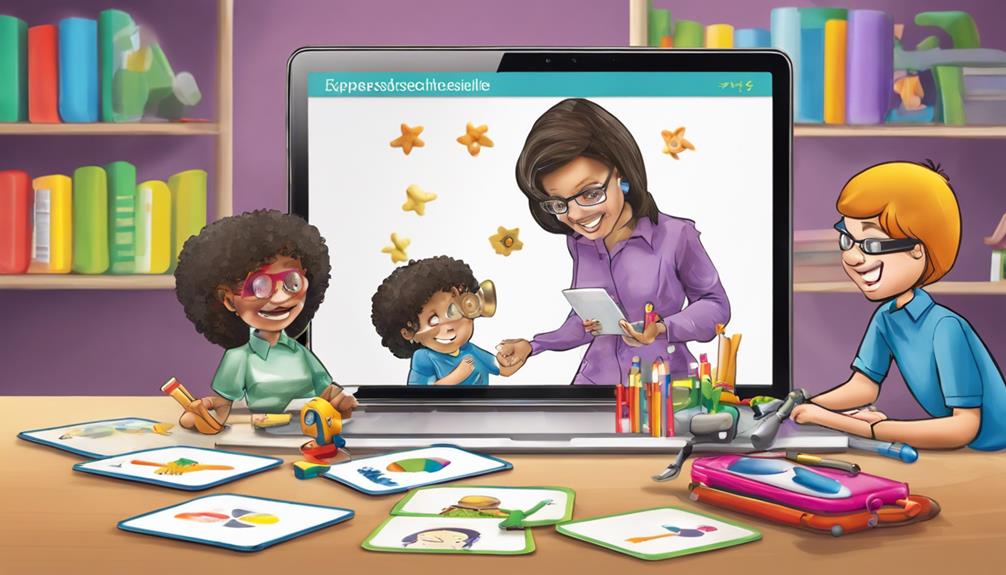
Imagine a world where words flow effortlessly, where communication is a seamless dance of expression. In this realm, Expressable speech therapy acts as a guiding light, illuminating the path to improved speech and language skills.
But how does this innovative approach actually work? Let's explore the intricacies of this virtual platform that is revolutionizing the way we connect and communicate.
Key Takeaways
- Expressable Speech Therapy offers personalized online sessions for speech, language, voice, and swallowing issues.
- Tailored treatment plans cater to individual communication needs and goals effectively.
- Certified therapists provide innovative therapy approaches with flexible scheduling options.
- Specialized care strategies address unique speech challenges for all ages.
Overview of Expressable Speech Therapy
At Expressable Speech Therapy, our certified speech-language pathologists provide personalized online sessions to address speech, language, voice, and swallowing issues from the convenience of your home. Our online platform offers a unique opportunity to receive speech therapy in a comfortable and familiar setting, eliminating the need to travel to appointments. Through our tailored care approach, our therapists design individualized treatment plans to meet each client's specific communication needs.
Communication is at the core of what we do. Our therapists work closely with clients to improve their ability to express themselves effectively and confidently. Whether it's articulation, fluency, voice modulation, or swallowing difficulties, our team is dedicated to helping clients enhance their communication skills.
With online therapy, clients benefit from the expertise of our therapists without the constraints of traditional in-person sessions. Our secure and private platform ensures that clients can access therapy from anywhere at a time that suits them best. Experience the convenience and effectiveness of online speech therapy with Expressable.
Benefits of Online Therapy Sessions

Moving forward, let's explore the advantages of engaging in online therapy sessions with Expressable Speech Therapy. Online speech therapy offers a range of benefits that cater to the needs of clients seeking convenient and effective speech therapy services. Here are some key benefits of choosing online therapy with Expressable:
| Benefits of Online Therapy Sessions | ||
|---|---|---|
| Flexible Scheduling Options | High Satisfaction | Secure Platform |
| Convenient Access | Text Support |
Expressable's online therapy sessions provide flexible scheduling options, allowing clients to easily fit therapy into their busy lifestyles. The high satisfaction rate, with an average rating of 4.9/5, underscores the effectiveness and quality of the online therapy services offered. Additionally, the secure platform ensures confidential care, while the convenient access to therapy 7 days a week enables clients to receive the support they need when it suits them best. Furthermore, the availability of text support throughout the week between sessions enhances the overall experience and progress in therapy.
Personalized Treatment Plans
Personalized treatment plans at Expressable Speech Therapy are meticulously crafted to address each client's unique speech and language requirements. Our therapists take the time to understand each individual's communication challenges and goals, allowing them to create tailored interventions that focus on improving speech clarity and boosting communication confidence.
By setting individualized goals, we ensure that our clients receive targeted interventions that are specifically designed to help them progress in their speech therapy journey. These plans aren't one-size-fits-all; instead, they're customized to meet the needs of each person we work with. Whether someone is struggling with articulation, language skills, or overall communication abilities, our personalized treatment plans are structured to support their development and growth.
At Expressable, we believe that by offering personalized care, we can better serve our clients and help them achieve their speech therapy objectives effectively. Our commitment to creating customized treatment plans ensures that every individual receives the support and attention they need to succeed in improving their communication skills.
Tailored Therapy for Unique Needs

At Expressable, we tailor therapy to meet your unique needs through customized treatment plans, a personalized approach to therapy, and individualized care strategies.
Our specialized therapists are dedicated to addressing your specific communication challenges to ensure effective and personalized treatment.
Whether it's accent modification, gender-affirming voice training, or other speech and language issues, we cater to individuals of all ages with a focus on achieving your individual goals.
Customized Treatment Plans
Crafting tailored treatment plans at Expressable involves precisely addressing each individual's unique speech therapy needs. Our approach is dedicated to providing personalized therapy sessions that target specific communication challenges and goals effectively.
To ensure the best treatment outcomes, specialized therapists are matched with clients based on their distinct needs for optimal progress and success. Treatment plans are meticulously designed to enhance speech, language, voice, and swallowing issues with care and precision.
Each therapy session is carefully crafted to focus on the individual's specific areas of concern, fostering continual progress and eventual success. Through this personalized approach, we strive to meet the diverse needs of our clients and support them on their journey to improved communication skills.
Personalized Approach to Therapy
Our focus on individualized treatment plans at Expressable seamlessly extends to tailoring therapy sessions to meet each client's unique needs and goals. Therapists at Expressable understand the importance of personalized care in speech therapy.
By creating tailored therapy sessions that align with each individual's communication objectives, we ensure that clients receive interventions specifically designed to address their speech, language, or communication disorder effectively. This tailored approach enhances the overall effectiveness of therapy by concentrating on the areas where improvement is needed the most.
At Expressable, we prioritize meeting the unique needs of each client, empowering them to make significant progress in their communication skills through our personalized therapy sessions.
Individualized Care Strategies
Tailoring therapy sessions at Expressable to meet the unique needs and goals of each client is paramount in our approach to individualized care strategies.
- Our specialized therapists are matched to clients based on their specific communication challenges and requirements.
- Customized therapy plans are designed to maximize progress and results for each individual.
- The focus is on providing personalized attention and support to help clients achieve their communication objectives.
Convenience of Online Sessions

We understand the importance of convenience in your busy schedule.
Virtual therapy offers benefits such as flexibility in scheduling and the ability to access sessions from anywhere.
These advantages make online speech therapy a practical and efficient choice for our clients.
Virtual Therapy Benefits
With virtual speech therapy sessions offered seven days a week, clients can conveniently receive care from the comfort of their own homes, eliminating the need for lengthy commutes to traditional therapy locations.
- Flexibility: Clients have the freedom to schedule sessions at times that suit their daily routines.
- Home Practice: Practicing speech exercises in a familiar environment can lead to more effective results.
- Secure Platform: Expressable ensures a confidential and safe online space for therapy sessions.
Scheduling Flexibility Advantages
For individuals seeking the convenience of online speech therapy sessions, Expressable provides flexible scheduling options that cater to busy lifestyles and varying time zones.
Our virtual speech therapy sessions are available seven days a week, offering clients the flexibility to fit therapy around their schedules. Through video chat, our online therapy works seamlessly, allowing clients to receive care from the comfort of their homes without the need for long commutes.
With our flexible hours, clients can easily schedule sessions that work best for them, ensuring consistent progress towards their speech therapy goals.
We understand the importance of accommodating busy lifestyles, and our platform prioritizes making speech therapy accessible and convenient for all.
Access From Anywhere
Ensuring accessibility from any location, Expressable offers online speech therapy sessions that provide convenience and flexibility for clients seeking to improve their communication skills.
- Clients can receive virtual therapy sessions from the comfort of their own home, eliminating the need for long commutes.
- Online sessions are available 7 days a week, offering flexible scheduling options to accommodate busy lifestyles.
- The platform used for online therapy is private and secure, ensuring confidentiality and a safe environment for therapy.
With the convenience of accessing a speech therapist online, individuals can benefit from the flexibility of scheduling sessions at their convenience. The secure platform used for virtual therapy sessions adds an extra layer of comfort and privacy, making the therapy experience more accessible and effective.
Communication Skills Improvement
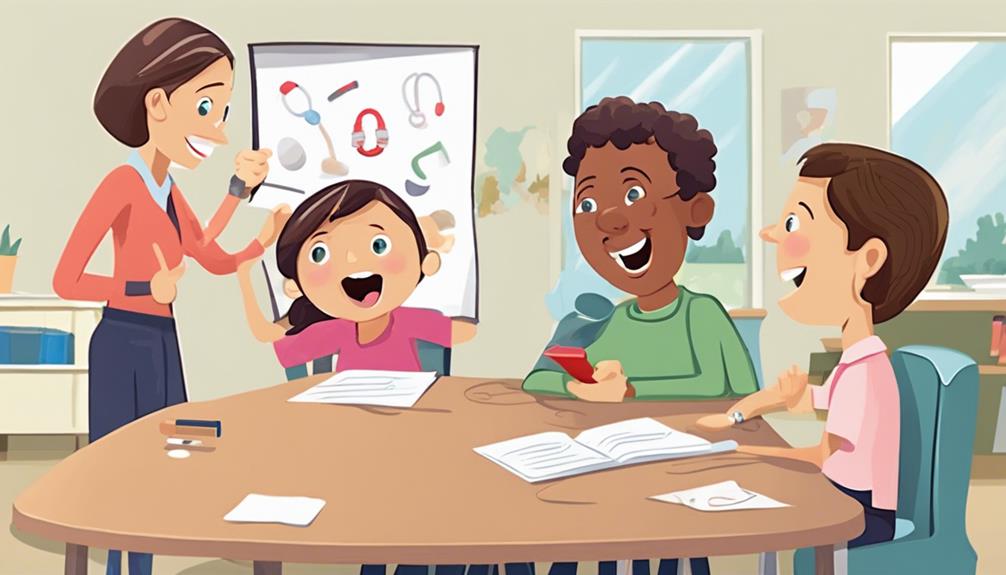
Improving communication skills through Expressable Speech Therapy leads to enhanced confidence and comfort in speaking. By targeting articulation, vocal techniques, and providing effective communication tools, individuals acquire the necessary skills to express themselves clearly and confidently.
Through tailored therapy sessions, clients engage in exercises that promote skill development and consistency in progress. The average satisfaction rating of 4.9/5 indicates high levels of contentment among clients, highlighting the effectiveness of the therapy in addressing speech challenges.
Additionally, the inclusion of texting support throughout the week offers continuous guidance and encouragement for applying newly acquired communication skills in real-life scenarios. This comprehensive approach ensures that individuals not only enhance their communication abilities but also feel empowered to communicate effectively in various contexts.
Expressable Speech Therapy equips clients with the tools and techniques needed to communicate confidently, ultimately leading to improved overall communication skills and increased self-assurance.
Overcoming Speech Challenges

Transitioning from improving communication skills, overcoming speech challenges with Expressable Speech Therapy involves personalized online sessions tailored to address a range of issues such as stuttering, aphasia, voice disorders, and more. Certified speech-language pathologists guide clients through targeted exercises to help them overcome their specific speech difficulties. These professionals work closely with individuals to create customized therapy plans that cater to their unique needs and goals.
The practice exercises recommended by the therapists are designed to reinforce the learning from sessions and accelerate progress in speech improvement. Through these personalized online sessions, individuals can work on enhancing their communication skills in a comfortable and convenient environment.
The supportive nature of the program aims to boost confidence levels and proficiency in both verbal and nonverbal interactions. Clients can expect dedicated guidance and expertise from experienced speech-language pathologists to navigate and conquer their speech challenges effectively.
Innovative Therapy Approach
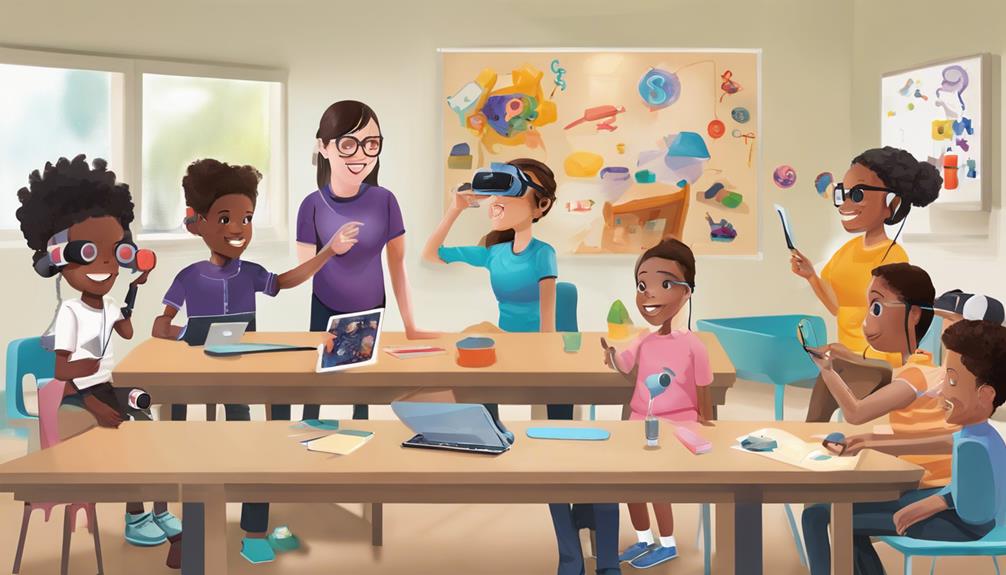
Utilizing cutting-edge technology and personalized therapy plans, Expressable Speech Therapy implements an innovative approach to address a variety of speech challenges effectively. Our tailored therapists work closely with clients to create individualized therapy plans that cater to specific needs and goals. Through live online sessions, clients engage in practice exercises designed to reinforce learning and promote progress between sessions. Additionally, we offer texting support throughout the week to provide continuous assistance and guidance.
Convenience is key in our therapy approach, with flexible scheduling options that make it easy for clients to fit sessions into their busy lives. Moreover, our focus extends beyond the virtual session, encouraging clients to apply newly acquired skills in real-life situations for tangible communication improvement. By practicing communication strategies in everyday scenarios, clients can see a direct impact on their ability to effectively convey their thoughts and ideas. This holistic approach sets Expressable Speech Therapy apart, ensuring comprehensive support for our clients as they work towards their speech therapy goals.
Revolutionizing Speech Therapy Services

Revolutionizing speech therapy services at Expressable involves incorporating cutting-edge technology and personalized care to enhance communication skills effectively. Our online speech therapy platform is designed to provide tailored services that cater to individuals of all ages in a convenient and accessible way. Here are three key aspects that set our services apart:
- Tailored Services: Each client receives personalized care from our certified speech-language pathologists, ensuring that the therapy sessions address their specific needs and goals effectively.
- Convenience: Through our online platform, clients can access speech therapy from the comfort of their own homes, eliminating the need for travel and allowing for flexible scheduling options to fit busy lifestyles.
- Accessibility: By focusing on online speech therapy, we aim to make communication skills improvement more accessible to a wider range of individuals, breaking down barriers to receiving quality care.
At Expressable, we're committed to providing a service that not only enhances communication skills but also prioritizes the convenience and accessibility of speech therapy for all.
Client-Centered Care Approach

At Expressable Speech Therapy, we prioritize a client-centered care approach, where therapy plans are customized to meet individual needs and goals.
Therapists track each client's progress closely, ensuring that treatment remains effective and tailored.
Personalized Therapy Plans
When creating personalized therapy plans at Expressable, we prioritize a client-centered care approach that tailors each plan to the individual's unique needs and goals.
- Therapy plans are customized to address the specific communication needs of each child.
- Client input is valued in setting therapy goals, fostering a collaborative relationship.
- The therapy plans evolve based on client progress, feedback, and changing communication requirements.
This personalized approach ensures that therapy at Expressable is effective, engaging, and aligned with the individual's communication journey. By focusing on the client's distinct needs and aspirations, we strive to provide a supportive and empowering environment for growth and development.
Individual Progress Tracking
Individual progress tracking at Expressable Speech Therapy is a pivotal aspect of our client-centered care approach, allowing us to tailor therapy sessions to meet each client's specific needs and goals. By monitoring individual progress closely, we can create personalized care plans that are adjusted based on each client's feedback and advancements. This approach enables us to optimize results by making real-time adjustments to therapy techniques, exercises, and goals. Our therapists are committed to using client-centered care approaches to monitor improvements, address any barriers hindering progress, and celebrate successes along the therapy journey. Through continuous assessment and adaptation of treatment plans, we ensure that each session is maximally effective and contributes to our clients' speech therapy goals.
| Benefits of Individual Progress Tracking | |
|---|---|
| Tailored therapy sessions | Personalized care plans |
| Optimized results | Client-centered care approaches |
Speech Therapy Co-Pilot System

The Speech Therapy Co-Pilot System by Expressable is a unique tool that enhances therapy outcomes for clients by providing personalized exercises and consistent text message support. This system aims to improve communication skills effectively by offering the following key features:
- Personalized exercises tailored to individual needs and goals, allowing clients to practice specific areas of speech and language between therapy sessions.
- Text message support throughout the week to encourage progress and consistency, providing gentle reminders and motivational messages to keep clients engaged.
- Guidance on implementing new skills and techniques in real-life communication scenarios, helping clients transfer what they learn in therapy to everyday interactions.
With the Speech Therapy Co-Pilot System, clients receive the necessary support and resources to reinforce their learning, enhance their communication skills, and track their progress effectively. This personalized approach ensures that clients can make meaningful strides in their speech therapy journey.
Learning and Progress Tracking
Our progress tracking tools at Expressable empower us to monitor improvements in speech and language skills effectively, allowing for tailored treatment plans and informed adjustments based on data and client feedback.
By utilizing data and feedback, our therapists can make precise modifications to treatment plans, ensuring optimal results for our clients.
Through regular updates on progress and achievements during therapy sessions, clients are actively engaged in their journey towards improved communication skills.
Our tracking methods, which include assessments, practice logs, and ongoing communication with therapists, provide a comprehensive view of each individual's progress.
This transparency and accountability within our platform not only enhances the effectiveness of therapy but also fosters a sense of trust and collaboration between therapists and clients.
At Expressable, we're committed to using cutting-edge progress tracking tools to deliver personalized speech therapy that prioritizes the unique needs and goals of each individual.
Success Stories and Testimonials

As clients progress through their speech therapy journey with Expressable, their success stories and testimonials highlight the transformative impact of our personalized approach. Our clients have shared inspiring stories of growth and development as they work towards their speech goals. Here are a few key points that stand out:
- Improved Confidence: Many clients have reported a significant boost in their confidence levels after engaging in therapy with Expressable. This newfound confidence has translated into more comfortable and effective communication in their personal and professional lives.
- Tangible Progress: Clients frequently mention the noticeable progress they make in addressing their speech challenges with the help of our tailored vocal techniques and communication strategies.
- Enhanced Communication Skills: Expressable equips individuals with the necessary skills to communicate effectively in diverse settings, empowering them to express themselves with clarity and precision.
These testimonials underscore the positive outcomes that can be achieved through dedicated speech therapy and the commitment of our team to support each client's journey towards improved communication.
Frequently Asked Questions
What Are the Two Types of Speech Therapy?
There are two types of speech therapy: pediatric and adult. Pediatric speech therapy focuses on children's communication and language development, while adult speech therapy addresses communication challenges in grown-ups, like voice disorders and accent modification.
Both therapies aim to enhance speech, language, and communication skills. Specialized therapists provide personalized care based on age and specific needs in each type of speech therapy.
How Does the Speech Therapy Work?
Well, speech therapy works wonders by helping us unlock our communication potential. Therapists guide us through exercises, build our confidence, and refine our vocal skills.
With Expressable, we receive tailored support to practice between sessions and even get texting help throughout the week. It's like having a personal speech coach right at our fingertips, empowering us to speak with clarity and confidence in real-life situations.
How Effective Is Virtual Speech Therapy?
Virtual speech therapy is highly effective, offering comparable progress to in-person sessions. Research indicates its success in improving speech and language skills, particularly benefiting those in remote areas.
The convenience of online therapy, with flexible scheduling and access to specialized therapists, has made it a popular choice. It provides a convenient and accessible way to receive quality care without the need for commuting.
What Is the Difference Between Speech Therapy and Voice Therapy?
Voice therapy and speech therapy differ in their focus. Voice therapy targets vocal function and quality, working on resonance and pitch control. On the other hand, speech therapy addresses a broader range of communication disorders like articulation and language.
Both therapies are provided by certified professionals but with distinct goals and techniques. Understanding these differences is crucial for individuals seeking treatment for voice or speech-related concerns.
Conclusion
In conclusion, Expressable speech therapy offers a convenient and effective way to address speech difficulties. With tailored therapy sessions, personalized treatment plans, and a client-centered care approach, individuals can enhance their communication skills from the comfort of their own home.
The Speech Therapy Co-Pilot system provides support and guidance throughout the process, making the journey to improved speech and expression a positive and empowering experience.
Join us on this journey to unlock your full communication potential.
Therapies and Interventions
Answering 'When' Questions in Speech Therapy Sessions
Get ready to unravel the mysteries of answering 'When' questions in speech therapy sessions and discover the key strategies for success.
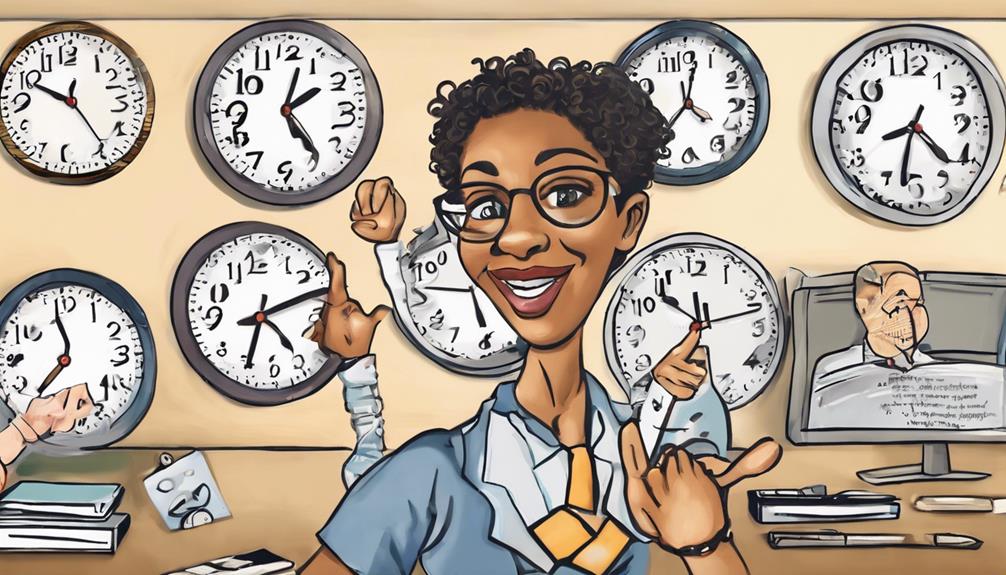
In speech therapy sessions, answering 'When' questions can sometimes feel like navigating a maze of uncertainties. We've all encountered those moments where time seems to slip through our fingers, leaving us grasping for explanations.
But fear not, as we explore effective strategies and engaging activities to unravel the mystery of 'When' in therapy. By understanding the significance of time concepts and incorporating creative approaches, we can help our clients master the art of answering 'When' questions with confidence and clarity.
Let's unravel the secrets together.
Key Takeaways
- Teaching 'When' questions improves children's time comprehension.
- Utilize daily routines and visual aids for effective learning.
- Incorporate calendars to enhance understanding of past, present, and future.
- Engage in interactive activities to practice answering 'When' questions.
Importance of 'When' Questions in Therapy
Understanding the significance of 'When' questions in therapy is paramount for enhancing children's comprehension of time concepts and their ability to respond to time-related inquiries. Time concepts are fundamental for navigating daily routines and understanding the sequence of events. By teaching children how to answer questions about 'When,' therapists can empower them to communicate effectively about past, present, and future events.
Employing specific teaching strategies tailored to time concepts is essential for facilitating learning. Visual aids, such as calendars and daily schedules, play a crucial role in reinforcing these concepts and making them more tangible for children. Engaging children in activities that involve 'When' questions not only makes learning enjoyable but also solidifies their understanding of time-related concepts.
Utilizing games and interactive exercises that focus on 'When' questions can effectively capture children's attention and enhance their ability to grasp the abstract nature of time.
Challenges in Answering 'When' Questions

Children with language delays often encounter significant challenges when asked 'When' questions due to the abstract nature of time concepts. 'When' questions require an understanding of temporal relationships and the sequencing of events. Difficulties in answering 'When' questions may indicate underlying issues with language comprehension.
Here are some key challenges faced when addressing 'When' questions:
- Abstract Time Concepts: Children may struggle with grasping abstract time concepts such as past, present, and future.
- Temporal Relationships: Understanding the order of events and how they relate to one another can be confusing for some children.
- Language Comprehension: Difficulties in processing and understanding language may hinder a child's ability to respond accurately to 'When' questions.
Navigating these challenges necessitates the use of effective teaching strategies that cater to each child's unique learning needs.
Strategies for Teaching 'When' Questions
In our speech therapy sessions, we implement various strategies to effectively teach 'When' questions to children with language delays. We utilize daily routines and calendars as tools to help children understand time concepts.
By incorporating fill-in-the-blank activities focusing on cause and effect 'when' questions, we encourage critical thinking and comprehension. Interactive activities such as snack projects and games are integrated to make learning engaging and memorable. These activities not only reinforce the understanding of 'when' questions but also make the sessions enjoyable for the children.
Additionally, we make use of a variety of resources like worksheets, games, and speech therapy kits specifically designed for teaching 'when' questions. By focusing on different time concepts such as day versus night, seasons, and situational scenarios, we aim to enhance the children's understanding of 'when' questions in a holistic manner.
Incorporating Daily Routines in Sessions
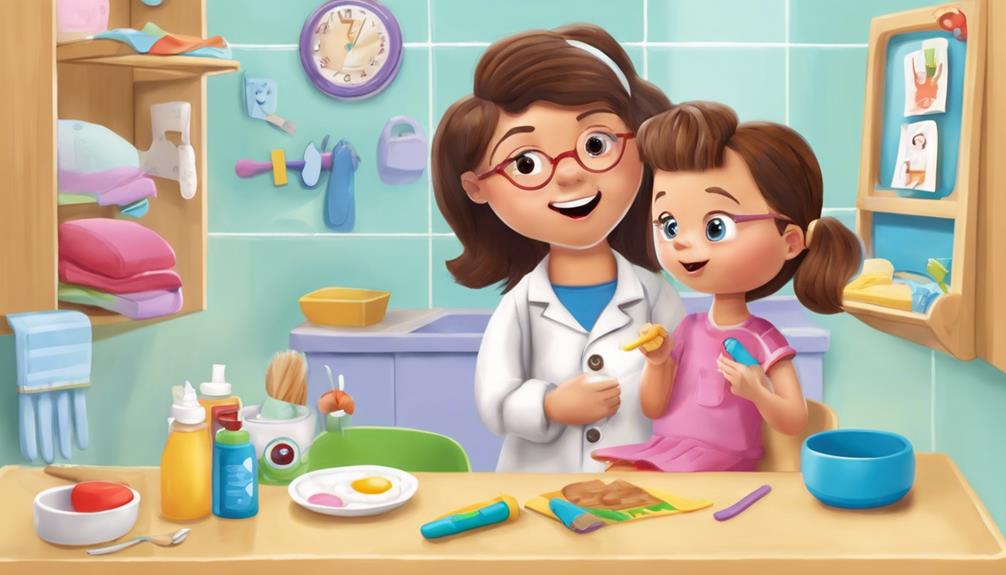
When incorporating daily routines in speech therapy sessions, we aim to utilize familiar activities such as morning routines, meals, and bedtime to teach 'when' questions effectively.
By integrating visual schedules and calendars, we provide structure and reinforcement for time concepts.
Practicing sequencing within daily activities helps children grasp time-related concepts crucial for answering 'when' questions.
Daily Routines Examples
Incorporating daily routines into speech therapy sessions provides structured opportunities for practicing time concepts and sequencing while enhancing children's understanding of the concept of time. Daily routines like morning routines, meal times, and bedtime can serve as excellent examples to teach these concepts effectively. By incorporating these routines, children can learn to answer 'when' questions more proficiently.
Visual support tools such as visual schedules and calendars can further aid in reinforcing these concepts. Moreover, practicing 'when' questions within daily routines not only helps in therapy sessions but also allows children to generalize these skills to real-life situations outside of therapy, fostering independence and confidence.
Routine-Based Therapy Benefits
By integrating daily routines into speech therapy sessions, we create a structured framework that enhances children's ability to comprehend time concepts and sequencing, ultimately improving their skills in answering 'when' questions effectively.
Daily routines provide a practical context for learning time-related concepts, such as before and after, which are crucial for understanding 'when' questions. Through routine-based therapy, children can practice linking activities to specific times, reinforcing their understanding of temporal relationships.
This approach not only aids in language skill development but also promotes independence in daily activities. By incorporating familiar routines like morning rituals and bedtime practices, therapists can help children navigate time concepts more proficiently, leading to enhanced communication and cognitive abilities.
Utilizing Calendars for Time Concepts
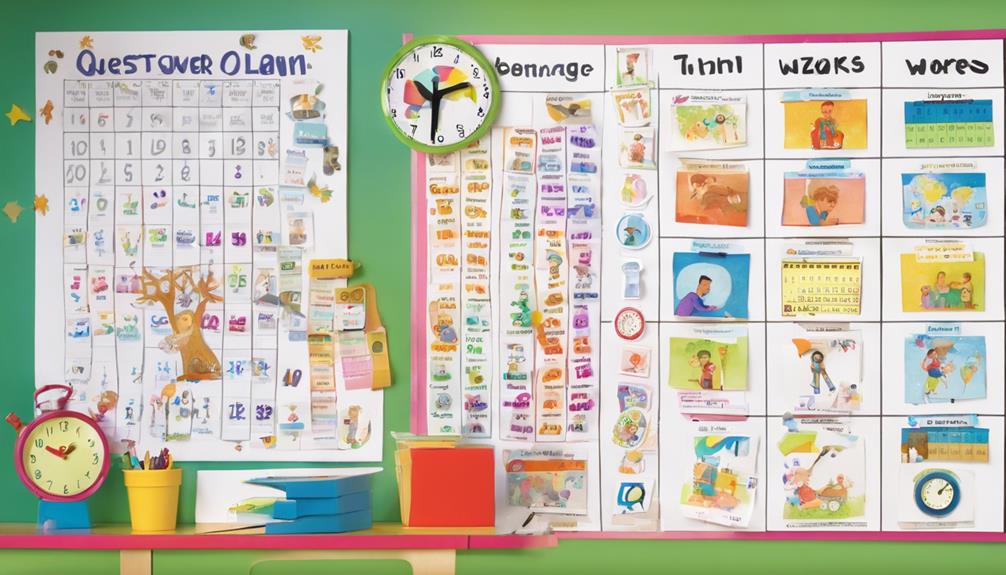
Utilizing calendars enhances the understanding of time concepts in speech therapy sessions. Calendars provide a tangible way to introduce and reinforce the idea of time, aiding in teaching 'when' questions effectively. Here are three key benefits of incorporating calendars in speech therapy sessions:
- Visual Representation: Calendars offer a visual representation of time concepts, making it easier for children to grasp the sequencing of events and understand timing.
- Organizing Daily Routines: By utilizing calendars, therapists can help children organize their daily routines and events, fostering better comprehension of when activities occur.
- Improving Time Awareness: Using calendars can enhance children's awareness of past, present, and future events, thereby improving their ability to respond to 'when' questions accurately.
Incorporating calendars into therapy sessions not only helps children associate events with specific times but also aids in predicting future activities and sequencing events effectively.
Enhancing Cause and Effect Understanding

Enhancing cause and effect understanding in speech therapy involves connecting 'When' questions to daily activities and using interactive techniques to reinforce learning. By teaching 'When' questions, children can grasp cause and effect relationships concerning time concepts. Utilizing daily routines and calendars can help solidify understanding by practicing before/after activities. Fill in the blank activities are beneficial tools to assist children in answering cause and effect 'When' questions, like eating when hungry or bedtime routines.
Integrating activities such as snack or craft projects, playing Clue Junior, and exploring various scenarios can effectively teach 'When' questions. Games, practical tasks, and visual aids play crucial roles in enhancing children's abilities to respond to 'When' questions during speech therapy sessions. These methods not only make learning enjoyable but also encourage active participation and understanding of cause and effect relationships. By incorporating these strategies, speech therapists can create engaging sessions that promote comprehension and retention of 'When' questions.
Engaging 'When' Question Activities

As we explore engaging 'When' question activities, we can consider various activity ideas that incorporate timing practice techniques and progress monitoring tips.
These activities aim to enhance the understanding of 'when' questions through hands-on experiences and interactive learning methods.
Activity Ideas for 'When
To engage students in practicing 'when' questions during speech therapy sessions, incorporate daily routines and interactive activities like snack projects and school calendars. Here are some engaging activity ideas for 'when' questions:
- Snack Projects: Create a schedule for making snacks together, asking questions like 'When do we eat lunch?' or 'When should we prepare our snack?'
- School Calendars: Use school calendars to identify important dates and events, prompting questions such as 'When is the next holiday?' or 'When does the school year end?'
- Clue Junior Game: Play games like Clue Junior that involve deducing 'when' events occurred, reinforcing the understanding of time concepts in a fun way.
Timing Practice Techniques
Engage students in speech therapy sessions by incorporating engaging 'When' question activities that focus on timing practice techniques. Utilize visual schedules to help children grasp time concepts and reinforce their understanding of 'when' questions effectively.
Implement sequencing activities that involve before/after scenarios to enhance sequencing skills, aiding in improved responses to 'when' questions. Introduce fill-in-the-blank exercises to teach cause and effect 'when' questions, fostering critical thinking abilities.
Progress Monitoring Tips
Monitoring progress in answering 'When' questions during speech therapy sessions can be effectively achieved through the use of data tracking sheets.
To ensure advancements in understanding time concepts and responding to 'When' questions, consider implementing goal-setting strategies.
Engage clients in role-playing scenarios to assess comprehension and application of 'When' question responses.
Utilize visual aids such as calendars and schedules to facilitate progress monitoring of 'When' question skills.
Collaboration with parents and educators to collect feedback on the effectiveness of these activities is crucial for adjusting intervention plans accordingly.
Interactive 'Day or Night' Game

During the 'Day or Night' game in speech therapy, children engage in activities that reinforce their understanding of daytime and nighttime concepts. The game provides structured practice to help children grasp time concepts effectively. By asking questions related to various activities like taking a bath, riding a bike, and eating breakfast, children learn to differentiate between daytime and nighttime tasks. This interactive activity encourages critical thinking and enhances children's ability to answer 'when' questions accurately. Here is a table summarizing the key aspects of the 'Day or Night' game:
| Key Aspects | Description |
|---|---|
| Interactive Activity | Engaging questions to help children distinguish between daytime and nighttime |
| Time Concepts | Focused on improving understanding of time concepts through fun activities |
| Structured Practice | Provides a structured way for children to practice answering 'when' questions |
| Day or Night Game | Reinforces learning by associating activities with specific times of the day |
| Critical Thinking | Encourages critical thinking about time-related activities |
Seasonal 'Winter or Summer' Game

We'll now explore the seasonal 'Winter or Summer' game, focusing on weather-related vocabulary practice, timing, event sequencing, and calendar-based activities.
This game offers children the opportunity to differentiate between winter and summer activities, such as swimming in summer and building a snowman in winter.
Weather-Related Vocabulary Practice
In speech therapy sessions, we engage children in a seasonal 'Winter or Summer' game to practice weather-related vocabulary. This helps them distinguish between activities associated with each season such as swimming, building a snowman, and wearing a coat.
Children learn weather-related vocabulary in a fun and interactive way. Understanding the differences between summer and winter activities is reinforced. The game aids in comprehending time and seasons better.
Timing and Event Sequencing
Engaging children in the seasonal 'Winter or Summer' game provides a dynamic approach to teaching timing and event sequencing concepts in speech therapy sessions. This game focuses on differentiating between winter and summer activities, such as swimming, building a snowman, or wearing a coat. By associating these activities with specific seasons, children can practice answering 'when' questions, enhancing their understanding of seasonal contexts.
Through this game, kids develop the ability to comprehend and respond to when questions based on the timing of events in different seasons. The interactive nature of the game makes learning fun and engaging, allowing children to grasp timing concepts effectively while enjoying seasonal activities.
Calendar-Based Activities
Utilizing a calendar-based approach, the seasonal 'Winter or Summer' game in speech therapy aids children in distinguishing activities linked to winter and summer seasons. This activity helps children grasp time concepts, understand seasonal differences, and develop critical thinking skills.
- Children learn to associate swimming with summer and building a snowman with winter.
- They practice identifying the appropriate season for activities like wearing a coat.
- The game encourages children to think critically about when specific activities typically occur in relation to the seasons.
Situational 'When' Question Game

The Situational 'When' Question Game challenges children to think critically about time concepts in various scenarios. This interactive activity is a valuable tool in speech therapy sessions to teach WH questions and enhance language skills. By prompting children to provide 'when' responses to different daily activities such as washing hands, eating, and sleeping, the game helps them apply their understanding of time effectively. The practical approach of this game encourages children to think about time in real-life situations, improving their comprehension and communication abilities.
| Benefits of the Situational 'When' Question Game | |
|---|---|
| Enhances critical thinking skills | Promotes practical application of time concepts |
| Improves language skills | Encourages active participation in speech therapy sessions |
Resources for Teaching 'When' Questions
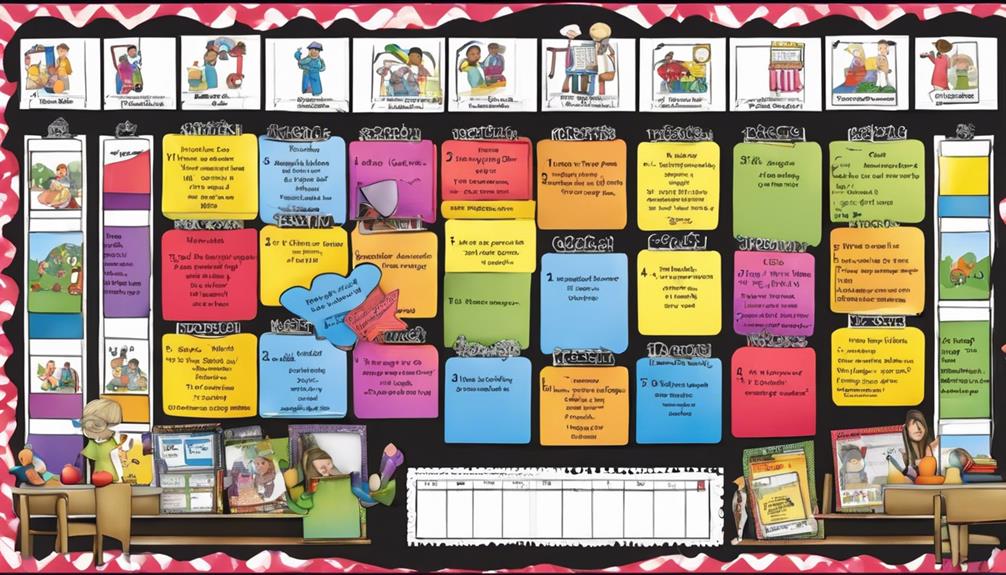
When teaching 'When' questions in speech therapy, we recommend utilizing visual schedules and calendars as effective tools for reinforcing time concepts. To enhance understanding and engagement, incorporating daily routines and activities can provide practical contexts for learning. Additionally, interactive games focused on time concepts can make learning 'When' questions more enjoyable and memorable.
Visual schedules and calendars: These tools help create a visual representation of time, making it easier for individuals to grasp the concept of 'When' questions.
Daily routines: By linking 'When' questions to everyday activities, such as meal times or bedtime, individuals can apply their knowledge in real-life situations.
Interactive games: Engaging in games that require answering 'When' questions can make the learning process interactive and fun, increasing motivation and retention of time concepts.
Fun Activities for 'When' Questions
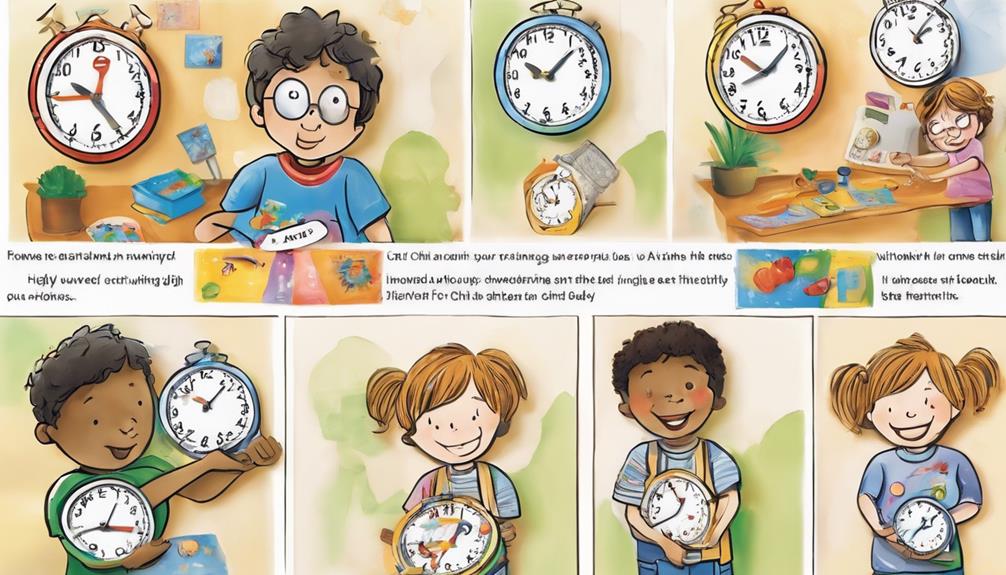
Engaging in interactive activities is a key component of teaching 'When' questions in speech therapy sessions. To make learning enjoyable, incorporating fun activities into sessions can be highly beneficial.
Snack or craft projects provide a hands-on experience while practicing answering 'when' questions. Using school calendars as visual aids can help in understanding time concepts related to 'when' questions in a practical way. Games like Clue Junior, which involve solving mysteries, can be a playful yet effective method to practice answering 'when' questions.
Exploring various activities tailored for teaching 'when' questions in speech therapy sessions can keep the sessions engaging and productive. By incorporating games and practical tasks, therapists can reinforce the learning of 'when' questions in a way that's both enjoyable and educational for their clients. These activities not only make the learning process more fun but also help in enhancing comprehension and retention of the concepts related to 'when' questions.
Targeting Time Concepts in Therapy
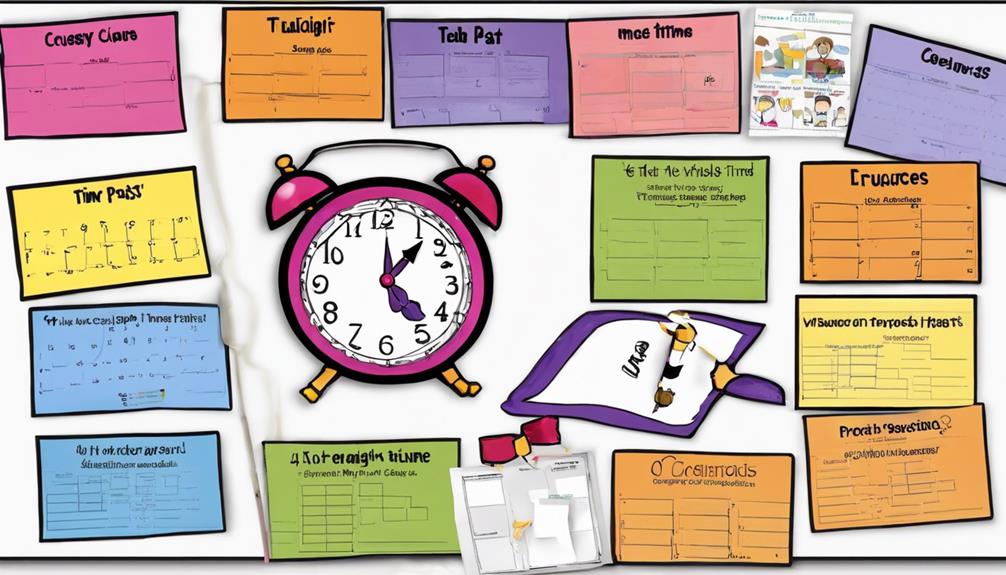
To effectively target time concepts in therapy sessions, incorporating daily routines and calendars can serve as valuable tools for enhancing children's understanding of time-related concepts when answering questions. Daily routines provide a structured way to introduce time concepts in a practical manner, while calendars offer a visual representation of time passing. By implementing these strategies, children can grasp the sequencing of events and learn to associate specific times of day with different activities.
- Daily Routines:
Establishing consistent daily schedules can help children develop a sense of time and understand the sequence of events throughout the day.
- Calendars:
Using visual aids like calendars can aid in teaching children about days, weeks, and months, allowing them to visualize the passage of time.
- Sequencing:
Engaging in activities that require sequencing events in chronological order can reinforce understanding of time concepts and improve the ability to answer 'When' questions accurately.
Supporting Clients in Answering 'When' Questions

When supporting clients in answering 'when' questions, we focus on using time-related cueing strategies and visual timeline tools to enhance comprehension.
These tools help individuals grasp the concept of time and sequence events accurately.
Time-Related Cueing Strategies
Utilizing visual aids like calendars, clocks, and schedules can significantly enhance clients' ability to respond to 'When' questions in speech therapy sessions. Time-related cueing strategies involve incorporating context clues, daily routines, and before/after sequences to support clients in understanding and answering 'When' questions effectively.
Here are three key techniques to assist clients in improving their time-related comprehension:
- Providing context clues and prompts related to daily routines and events
- Using before/after sequences and time markers such as yesterday, tomorrow, and next week
- Implementing structured routines and repetitive practice
Visual Timeline Tools
Visual timeline tools play a crucial role in speech therapy sessions by providing a clear sequence of events to assist clients in understanding and answering 'When' questions. These tools incorporate pictures, symbols, or words arranged chronologically to help individuals grasp the concept of time. By utilizing visual timelines, clients can enhance memory recall and comprehend past, present, and future events related to 'When' questions.
Engaging with visual aids like timelines enables clients to practice sequencing events and develop a deeper understanding of time concepts during speech therapy sessions. The use of visual timeline tools not only enhances engagement but also facilitates learning, ultimately improving clients' ability to effectively respond to 'When' questions.
Frequently Asked Questions
How Do You Answer Why Questions in Speech Therapy?
When answering 'Why' questions in speech therapy, we encourage reasoning and understanding cause and effect relationships. It's crucial to connect 'Why' questions to personal experiences for better comprehension.
Various strategies, like visual aids and real-life examples, help prompt children to provide logical explanations. Monitoring progress involves observing the child's ability to reason and explain different situations.
It's essential to foster critical thinking skills in responding to 'Why' questions effectively.
What Is the Hierarchy of Questions in Speech Therapy?
At the core of speech therapy question hierarchy lies a structured progression from simpler to more complex inquiries. Starting with concrete questions like 'what,' we gradually advance to abstract ones like 'when.'
Mastering lower-level queries is crucial before tackling higher-level ones. This methodical approach fosters critical thinking and enhances comprehension skills.
Building a solid foundation with fundamental questions is key to confidently navigating the more intricate aspects of speech therapy question hierarchy.
How Do You Work on Where Questions?
When working on where questions, we focus on teaching spatial concepts related to location. We use visual aids like maps, calendars, and role-playing scenarios to help children understand and respond accurately.
Activities involving identifying locations and using prepositions like 'in,' 'on,' 'under,' are essential. We also incorporate games and interactive tasks to make learning fun and engaging.
How Do You Make a Speech Therapy Session Fun?
When we make a speech therapy session fun, we engage our clients through interactive games like Zingo and memory games. By incorporating sensory bins with themed activities and utilizing sticker books, picture scenes, and interactive technology like Boom Cards, we create a dynamic and enjoyable learning environment.
Collaborating with educators and parents helps us enhance the fun factor by incorporating diverse language targets and interactive resources. Visual aids, such as wordless picture books, further enrich our sessions.
Conclusion
In conclusion, by incorporating interactive activities, visual aids, and practical tasks into speech therapy sessions, children can improve their ability to answer 'When' questions and understand time concepts better.
Engaging in games, hands-on activities, and collaborative approaches can make learning fun and effective for children with language delays.
It's important to reinforce time-related skills through daily routines and utilize resources like calendars to support clients in mastering 'When' questions.
Therapies and Interventions
Top 5 Auditory Verbal Therapy Clinics Near Me
Discover the top 5 Auditory Verbal Therapy clinics near you, offering expert care and tailored plans for enhancing communication skills – your journey awaits!

As we contemplate improving Auditory Verbal Therapy for our cherished ones, we are drawn to the search for the top 5 nearby clinics.
The expertise, care, tailored plans, and enhanced skills offered by these clinics hold promise for those seeking to navigate the world of auditory challenges.
With a focus on fostering communication confidence in children with hearing loss, these clinics pave the path towards a brighter future.
Key Takeaways
- Clinic A specializes in developing listening and spoken language skills for children with hearing loss.
- Clinic C emphasizes personalized auditory verbal therapy for optimized language development.
- Clinic D focuses on enhancing auditory and verbal skills in children with hearing loss.
- Clinic E offers individualized Auditory Verbal Therapy plans and a 'Communicate With Confidence' program.
Clinic A: Expertise in Auditory Verbal Therapy
With a focus on developing listening and spoken language skills for children with hearing loss, Clinic A stands out for its expertise in Auditory Verbal Therapy. Situated within the Texas Hearing Institute, Clinic A is renowned for its specialized approach in helping children with hearing impairments develop spoken language. Utilizing evidence-based practices, the highly trained professionals at Clinic A work diligently to support children in achieving age-appropriate communication milestones. By offering individualized therapy plans tailored to each child's unique needs and goals, Clinic A ensures optimal progress in auditory development.
Families play a crucial role at Clinic A, actively engaging in therapy sessions to enhance their child's auditory learning and language acquisition journey. The success of Clinic A's Auditory Verbal Therapy program is evident in the improved communication abilities and enhanced quality of life experienced by children with hearing loss who receive services at the clinic. Through a collaborative and personalized approach, Clinic A remains dedicated to empowering children with hearing loss to thrive in their communication skills and overall development.
Clinic B: Specialized Care for Speech Challenges

Specializing in tailored interventions for children facing speech challenges, Clinic B delivers expert auditory verbal therapy services to support speech articulation and communication skills effectively. The clinic's focus on individualized therapy plans ensures that unique speech difficulties are addressed with precision and care.
Here are three key aspects that set Clinic B apart in providing specialized care for speech challenges:
- Experienced Therapists: Clinic B boasts a team of experienced speech therapists who are dedicated to providing targeted interventions for speech development. Their expertise allows for the implementation of evidence-based practices to enhance speech articulation effectively.
- Parental Involvement: At Clinic B, parents play a crucial role in therapy sessions to support their child's speech progress. The clinic recognizes the importance of involving parents in the therapy process to ensure continuity of care and maximize the child's outcomes.
- Holistic Approach: Clinic B takes a holistic approach to address speech challenges, considering the child's unique needs and tailoring therapy plans accordingly. By focusing on the individual child, Clinic B ensures that each therapy session is personalized for maximum effectiveness.
Clinic C: Tailored Treatment Plans for Hearing Needs
Recognizing the critical importance of tailored treatment plans for addressing hearing needs, Clinic C emphasizes personalized auditory verbal therapy to optimize listening and spoken language development.
Located in Houston, Clinic C specializes in creating individualized therapy plans for children with hearing loss, utilizing a combination of hearing aids and cochlear implants to enhance auditory skills. The clinic's focus is on helping children associate sounds with meanings, fostering critical listening abilities crucial for those facing auditory challenges.
By providing comprehensive evaluations, Clinic C ensures that each child receives a therapy plan tailored to their specific needs, ultimately supporting their journey towards improved communication and language development.
With a commitment to personalized care and evidence-based practices, Clinic C stands out as a top choice for families seeking specialized auditory verbal therapy in the Houston area.
Clinic D: Enhancing Auditory and Verbal Skills
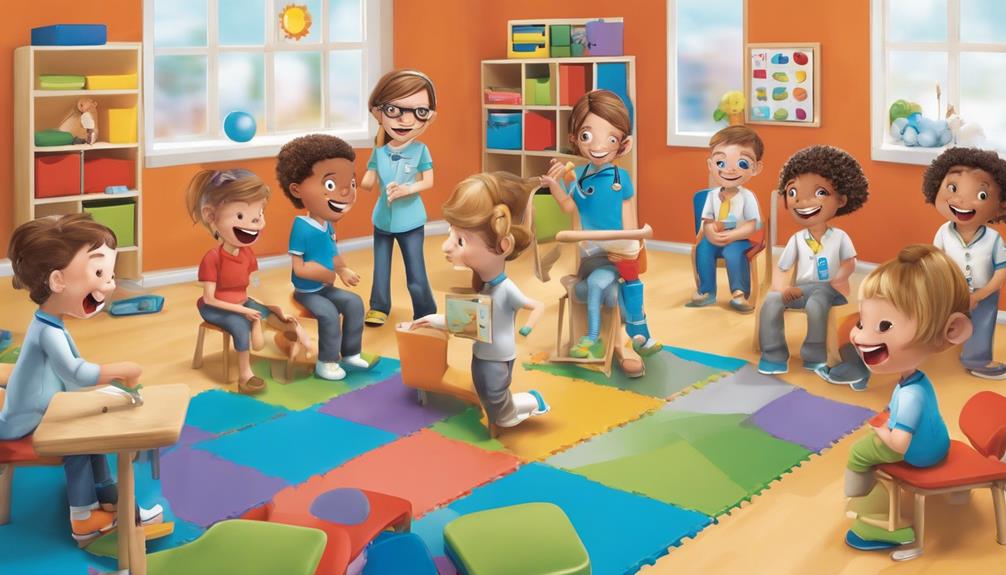
In enhancing auditory and verbal skills for children with hearing loss, Clinic D focuses on providing comprehensive evaluations to assess current levels in audition, language, speech, vocabulary, and development.
Key Features of Clinic D:
- Listening and Spoken Language (LSL) Therapy: Clinic D offers LSL therapy to help children associate sounds with meanings and acquire critical listening skills.
- Parent-Centered Services: They provide bilingual speech therapy, aural rehabilitation, and auditory-based therapy for children with additional disabilities, focusing on involving parents in the therapeutic process.
- Virtual Therapy Services: Clinic D offers virtual therapy services for convenient access, ensuring tailored support for children with hearing loss through online platforms.
Clinic D's expertise in assessing implant candidacy and tailoring interventions to enhance auditory and verbal skills makes them a valuable resource for families seeking specialized care for children with hearing loss. Their commitment to comprehensive evaluations and personalized therapy sets them apart and has garnered positive reviews on platforms like Yelp.
Clinic E: Communicate With Confidence
At Clinic E, our focus is on empowering children with hearing loss to develop confident communication skills through individualized Auditory Verbal Therapy plans. Our specialized 'Communicate With Confidence' program tailors therapy to enhance listening and spoken language abilities in children. We prioritize creating personalized strategies that cater to each child's unique needs, ensuring effective progress towards achieving their full communication potential.
Our team of highly trained professionals at Clinic E is dedicated to providing unwavering support and guidance to families throughout the therapy journey. By fostering a nurturing and encouraging environment, we aim to instill confidence in both children and their caregivers, leading to successful outcomes in communication development.
If you're searching for one of the best places near you to support your child's auditory verbal therapy needs, Clinic E is here to help. Your feedback is invaluable to us as we continuously strive to improve our services and make a lasting impact on the lives of children with hearing loss.
Frequently Asked Questions
What Is the Difference Between Speech Therapy and Auditory Therapy?
Speech therapy focuses on improving speech and language skills, while auditory therapy aims to develop listening skills in individuals with hearing loss.
Speech therapy helps with articulation and language expression, while auditory therapy focuses on enhancing auditory skills and processing.
Both therapies play crucial roles in improving communication for individuals with hearing loss. They can complement each other in overall skill development.
Is Auditory Verbal Therapy Effective?
Yes, auditory verbal therapy is effective. It has been proven through research to help children with hearing loss achieve age-appropriate language and communication skills.
By focusing on developing listening skills, spoken language, and communication in intensive therapy sessions, AVT optimizes a child's use of hearing technology.
Active participation of parents or caregivers in creating a language-rich environment further enhances the child's auditory learning experience.
What Is Auditory Verbal Therapy or LSL Approach Is the Therapy of Choice For?
Auditory Verbal Therapy (AVT) and the Listening and Spoken Language (LSL) approach are preferred for children with hearing loss or auditory processing challenges. These methods focus on developing listening and spoken language skills without relying on sign language.
AVT aids children in mainstream education and effective communication by enhancing auditory and speech abilities. The goal is to optimize a child's auditory development and speech production through individualized therapy sessions.
What Is Hearing Therapy Called?
We call hearing therapy Auditory Verbal Therapy (AVT). AVT focuses on developing listening and spoken language skills in individuals with hearing loss. The goal is to optimize access to sound and enhance communication abilities.
AVT is administered by certified Auditory Verbal Therapists (AVTs) who specialize in working with hearing-impaired individuals. Sessions are intensive, individualized, and family-centered to maximize the potential for listening and spoken language development.
Conclusion
In conclusion, the top 5 auditory verbal therapy clinics near me offer specialized care and expertise to help children with hearing loss reach their fullest potential in communication and language development.
With tailored treatment plans, individualized therapy, and a focus on enhancing auditory and verbal skills, these clinics provide the support needed for children to communicate with confidence.
Isn't it amazing how these clinics can make such a difference in a child's life?
Jamie is one of the creative forces behind the words that resonate with our audience at Deaf Vibes. With a passion for storytelling and advocacy, Jamie delves into topics that matter deeply to the deaf and hard-of-hearing community. Jamie’s articles are crafted with empathy, insight, and a commitment to positive change, from exploring the latest advancements in hearing technologies to shedding light on the everyday challenges and victories of those within the community. Jamie believes in the power of shared stories to inspire action, foster understanding, and create a more inclusive world for everyone.
-
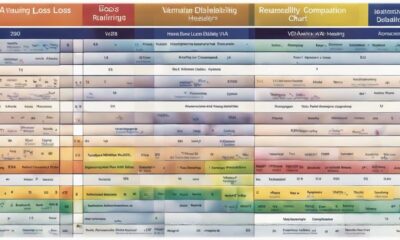
 Navigating the VA System1 month ago
Navigating the VA System1 month agoVA Hearing Loss Rating Chart: Understanding Disability Compensation
-

 Therapies and Interventions2 weeks ago
Therapies and Interventions2 weeks ago10 Auditory Processing Goals for Effective Speech Therapy
-

 Vetted2 months ago
Vetted2 months ago15 Best Oticon Hearing Aids to Improve Your Hearing in 2024
-

 Navigating the VA System1 month ago
Navigating the VA System1 month agoUnderstanding Bilateral Hearing Loss VA Rating Criteria
-

 Tinnitus1 month ago
Tinnitus1 month agoVA's Rating System for Tinnitus and Hearing Loss Explained
-

 Sign Language1 week ago
Sign Language1 week agoMastering the Art of Signing Letters in Sign Language
-

 Sign Language2 weeks ago
Sign Language2 weeks agoSign Language Emoji Translator: How to Communicate With Gestures
-

 Sign Language3 months ago
Sign Language3 months agoMedical Sign Language PDF: A Comprehensive How-To Guide
